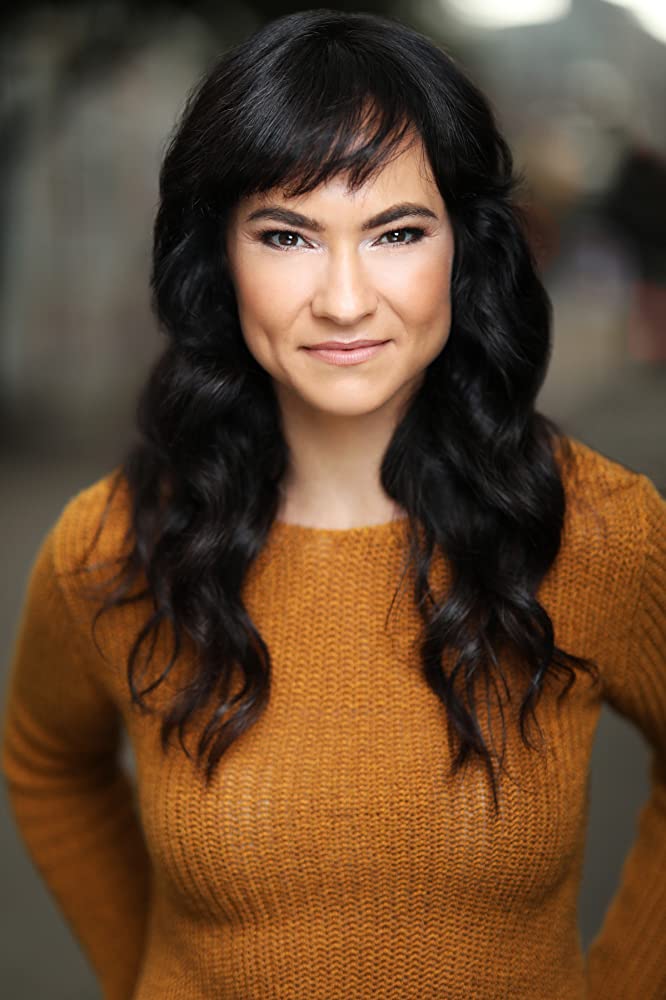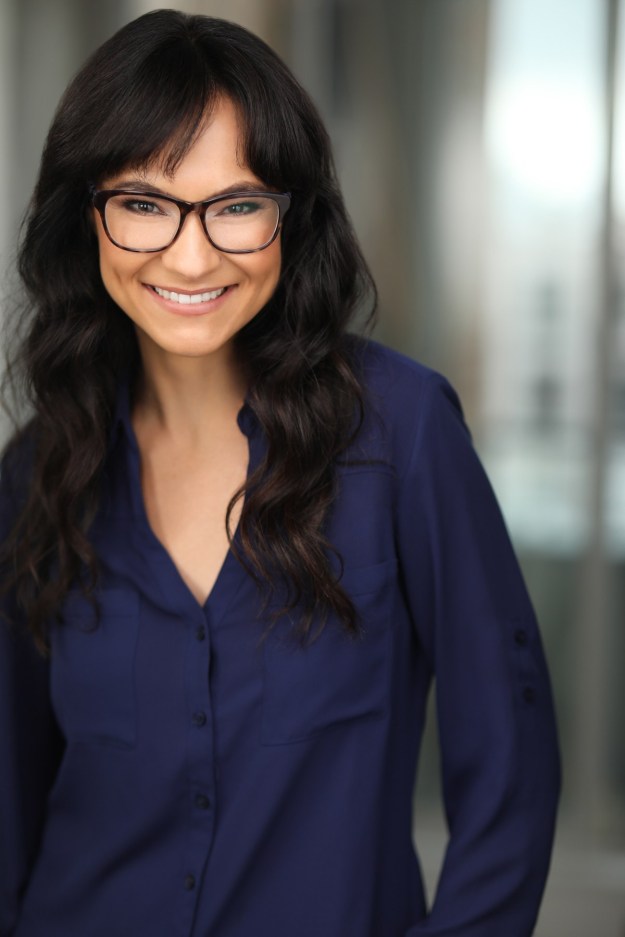Imagine an alternate America where 300 years ago, a deal was struck between witches and government to not persecute them in exchange for the countries protection. Women become the heroes with the dominant ones fighting on the front lines protecting the country from terrorists with supernatural tactics and weapons. Basic training finds three young women that stand out amongst the rest in combat magic. How will their contributions shape the countries defenses?
If this idea intrigues you, then what you’ve imagined can now be realized. The new TV series Motherland: Fort Salem brings a unique spin to Wednesday nights. It premieres on the Freeform network and ABC Spark on Wed. March 25. It will screen both episodes 1 and 2 back to back in order to catch up to the US. Emilie Leclerc can be seen at her best, first appearing on this thrilling new series on April 8.
Emilie Leclerc has come to know the stage as her own backyard. She grew up in St-Georges, a small town south of Quebec City. Fifteen years ago, she moved to Vancouver to follow her childhood dream of performing and to attend theatre school. She has studied at Studio 58 in the three-year theatre program. In addition, she has also trained with Andrew McIlroy and Ben Ratner. Emilie has also appeared in episodes of Strange Empire (CBC) since expanding her talents into the TV medium. Emilie Leclerc is best-known for her Jessie nominated roles in the theatre productions, L’Enfant-Problème, Bonjour, là bonjour, A Charlie Brown Christmas and A Charlie Brown Holiday double bill. Her talented performances have also made Emilie a Jessie Award Recipient in the ‘Outstanding Performance – Theatre for Young Audience’ category, shared with Zak Tardif and Vincent Leblanc-Beaudoin for Mathieu Mathématiques. I was lucky enough to snag a warm and generous interview with this multi-talented and very charming actress before hugging and personal greetings became taboo, due to the Coronavirus raining into town. I really wish I spoke French because Emilie has a terrific accent. She also speaks intermediary Spanish and is learning Mandarin. For the purpose of the interview though, we chose plain English.
“What was it that made you want to try acting behind the camera rather than on stage?”
“I really like the intimacy that we can create through film and TV, how close the lens is and how deeply connected you have to be with your scene partner in order to create that world; it’s something I’ve always been interested in. I don’t want to say goodbye to theatre because it’s always going to be part of my life but I am hoping to have a healthier balance where there is space for me to take on some film and TV projects.”
“What types of roles interest you?”
“I like to pay intelligent and fierce women that are really multi dimensional. We (women) are lucky to have that coming more and more in Vancouver and Motherland is a good example of that. It has such a strong female cast.”
“Motherland: Fort Salem has strong female characters that are in charge of men. Was there a lot of competition for your role?”
“Yeah… it was really interesting. I will always remember, I think it was my second or third table read with the network. We were reading the episode we were shooting and I looked around the table and ‘wow’, there was only 1 male actor and the rest were female actors (laughing), that’s never happened to me! Usually there’s always more male parts but this time around, things are changing. I think Eliot Laurence, who created this piece is very smart and has created such multi-dimensional characters. They’re not the wife of… or the girlfriend of… they’re making things happen and leading the country; it’s very exciting. They even made an effort to include female writers and female directors as well. It’s so lovely to see that they created that space for under represented voices to shine.”
“Is this show financed through an American studio?”
“Yes it is. Freeform is American and owned by Disney, so it’s a cable network in the US and it also has an online streaming platform in the US. It can be seen in Canada on ABC Spark starting on March 25th at 8 pm and there’s a 2 hr. series special with 10 episodes in total. We finished season 1 and we’re all hoping for a second season.”
“Does taking on a new role like this require training or research?”
“I actually worked with Andrew McIlroy for this because I felt like I was new to the world of television. Even though I’m in my 30’s, I’m not new to acting but new to this medium. I wasn’t sure how many episodes I’d be invited to be a part of but from one episode to the next I was asked to do something different with my character, which allowed me to be more versatile. It was very exciting and a challenge I was ready to undertake. My character is a scientist and a teacher in the military as well. I want to tell you what I did for research but I don’t want to spoil any scenes for you (laughing). It was great!”
“I wanted to ask you about your process of preparation before stepping out onto a stage or film set. Can you explain what that’s like?”
“I really work with a lot of connection to breath and ground (laughing). It sounds a bit spiritual but it’s really important to me. I like to focus on the present and not anticipate what can happen, right or wrong but staying present in the moment. I really do a lot of work, whether it’s on a theatre gig, on a film gig or on a voice gig. I have my daily work out routine where I try to ground myself and stay connected.”
“How long does it take to shoot one episode?”
“It depends how many scenes I have in one episode. If I only have 1 or 2 scenes in the episode sometimes it’s only one or two days of shooting. I believe we’d finish shooting an episode every two weeks and it lasted three months. Some of the leads are from other countries, such as the US, South Africa and all over. The scenes I was a part of were shot locally.”

“Is your process the same for stage and film sets when you are getting ready to step out onto the stage?”
“There’s the text analysis, learning your lines and thinking about the moment before and my relationship to all these people and creating personal context for me to make sense of that. There’s a lot of research that goes into my TV and theatre work. These things are all the same but I think when it’s time to start a play or when the camera’s rolling, that letting go and living through the scene is the same. In the theatre world, the gestures can be a bit bigger, the voice can be bigger but all of the work with the intention, the relationship to your characters and to other people is the same. I think it’s a matter of size; the camera is so close to you that, just a smile or a frown can mean so much but on stage you might need to add a move to accompany that.”
“What would you think is the biggest difference when transitioning from theatre to film?”
“I think in the TV world you have to be more self sufficient, especially when you’re working with a different director on every episode. Sometimes I find there’s less feedback or time for conversations with the director about your choices as an actor. You’re left to assume, if there’s no conversation or no notes then what you’re doing is fine. In the theatre world you have more time to assess these things. In the TV world I think you have to almost direct yourself to make sure that you’re creating content that makes sense from one episode to the next with a performance that evolves.”
“Do you still get cold feet stepping out on stage?”
“Opening night is always great and you never know how the audience is going to react. That’s another big difference between the theatre world and the TV world; in the theatre world my performance is informed by the audience reaction from one night to the next because I feel them. From an outside perspective the performance looks the same but every night is different for me. I’m listening and engaging with the audience, whereas with TV you don’t get that feedback until it starts screening. I still get cold feet when I’m first meeting the audience because they help me by informing my performance, which can be nerve wracking.”
“In the series Motherland: Fort Salem you play a witch named Izadora, how did you go about making the role your own?”
“Izadora has a very earthy/motherly energy to her, so to me that was easy because its part of me too. In terms of caring for others, I’ve been a teacher before and have worked with young people before. My character is one that connects on a personal level with some of her students.”
“I want to ask you about some of the awards you’ve won for theatre. Can you expand on that experience?”
“The Jessie Award I’d won was with Vincent Leblanc-Beaudoin and Zak Tardif for performing in the play Mathieu Mathématiques. The play toured in schools around British Columbia and Alberta; we did over 75 performances in 4 months. I’ve also been nominated for another Jessie Award for playing Lucy in The Charlie Brown Christmas. Last year, Carousal Theatre for Young People produced a Charlie Brown holiday double bill. We would perform A Charlie Brown Christmas and You’re a Good Man Charlie Brown, which is closer to the Broadway musical. They double billed these two shows together as a Christmas special and we performed it on Granville Island over the holiday season. We performed the show over 60 times and it was the second time I was nominated for my performance for Lucy. I was also nominated for another play I did in 2011 called L’Enfant-Problème by George F. Walker. I was playing a young mother whose child had been taken by Child Services.”
“Is it difficult to sometimes shed a character/leave them behind after a role?”
“It’s always hard to leave projects behind because you fall in love with the character you play but also because of the great community that is built when working on a project. I felt similar with Motherland because I started connecting with the crew, the creator and fellow cast members. Over the years you get used to it but it never gets easy because you have a family for a few months… and then you don’t (laughter).”
“Is Motherland set in modern times or is it futuristic?”
“It’s set in an alternate reality/world.”
“You’re going to be directing your first play, what spawned that decision?”
“This is my first time directing a play that I haven’t written. The company has gifted me the job of directing it and choosing who I wanted to collaborate with, so I’m very grateful for the chance. Being a theatre actor that has acted for young audiences for a very long time I feel like this is the right time for me to turn the tables and begin directing for young audiences.”

“What would be some of the challenges as a theatre director in comparison to acting?”
“I was reading about the French-Canadian director Denis Villeneuve, who I really admire. He said something that really resonated with me, which was, ‘at some point you are leading a team of people that you have to agree might be better than you/have better ideas than you and the task of a good leader is to listen to the voices, enhance them but lead the project so that the story is told the way you want it while leaving space for all the artists involved to shine and do their best work. When you are acting, you only have the control over your work and your character’s story. But when you direct, you have to find the balance in inspiring everybody to do their best work around you, while guiding the overall story you want to tell.
“How important is timing in a live performance? Would you count seconds in delivering a line?”
“We never count seconds but in rehearsal we find the rhythms of the words and we discuss sections that need to be quicker and others that need to be slower. There’s a reason behind the characters arc, the pauses and the fast paced lines being delivered. There’s discussions around it but the actors never have to deliver their line within a certain time but I do work rhythmically a lot and because some of our sections are underscored the actors have to get used to working with music, therefore there’s a certain rhythm that establishes itself from one show to the next.”
“In films, there are often running themes. Is there a running theme in this theatre production?”
“In this play there is, which is the connection to nature and how an individuals connection to nature can have a transformative effect on them. This play is about a little girl with a ‘Dennis the Menace’ attitude. She’s really mean to people, to her schoolteacher and her neighbor. She gets shrunken down to the size of an elf and befriends a seagull. They meet some Canadian geese and travel through the western part of Canada and she sees the ocean for the first time. She then goes through the forest and transforms through connection with nature. When she returns home she’s changed, is no longer a little brat (laughing) and is much more respectful. I think what keeps me grounded to life is my connection to nature. I like to hike in the forest and I do feel close to the theme in the play. I think in this day and age, it’s time to make nature magical again for children.”
Emilie is excited, curious and very interested to be embarking into the new medium of TV and film. It’s a new world for her that she’s still learning about and she really loves the craft of it. She’s not giving up the theatre world but she is looking forward to her next challenge, which is TV. She also loves film and we could very well see her in a future blockbuster, given her tremendous acting ability. I believe any production would be very lucky to have her as part of the cast or the lead.’’

